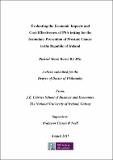| dc.description.abstract | Prostate cancer (PCa) incidence, internationally, has steadily increased since the latter half of the twentieth century as with the prevalence of other cancers. (Jemel et al, 2008; Jemel et al, 2011) It is recognised that increased incidence of PCa is partially driven by widespread use of prostate specific antigen (PSA) testing as a screening mechanism. (Drummond et al, 2010; Etzioni et al, 2002) The PSA test, a blood test measuring protein in the prostate, was discovered by Dr. Robert Ablin in the 1970’s as a way of monitoring PSA levels post-treatment for purposes of preventing relapse; Dr. Albin now refers to the test as ‘a hugely expensive public health disaster.’ (Albin R, 2010) He is not alone in this assertion as the use of PSA testing has sparked continued debate internationally; not only is it argued the PSA test has inadequate levels of cancer detection properties, but evidence highlighting a mortality benefit as a screening mechanism for PCa is limited and open to much debate. (Ilic et al, 2013)
Between 1994 and 2005, the use of PSA testing in primary care in the Republic of Ireland (RoI) increased fivefold; with estimates up to 2012 suggesting a twelvefold increase since 1994. (Drummond et al, 2010; NCRI, 2014) The use of widespread PSA testing in the RoI has contributed to high, measured incidence of PCa and in 2006 and 2008 the RoI had the highest measured incidence in Europe; in 2012 PCa incidence in the RoI was the 4th highest across Europe and the 10th highest globally. (Ferlay et al, 2010; Jemal et al, 2011; WCRF, 2014) The impact of increased PCa detection both on resource utilisation and quality of life (QoL) are not fully understood in the RoI and internationally; similarly, the rationale behind the levels of testing in the RoI compared to the rest of Europe is unclear. The costs of PCa care however, are substantial with a recent study estimating the economic burden of healthcare costs associated with PCa in the RoI at €51 million for 2009. (Luengo-Fernandez et al, 2013) Financial costs are only one piece of the puzzle, albeit the most explicit piece; the impact of over-diagnosis (the diagnosis of a condition or disease more often than it is present, or in the case of PCa when diagnosis has increased health risks compared to non-diagnosis) on QoL has not been assessed to date in the RoI and limited knowledge of this area is available internationally.
Due to the multi-faceted dimension of the costs and consequences of using PSA testing (as opposed to not), a full economic analysis of PSA testing as a mechanism for the secondary prevention of PCa using population-based data, country-specific costs and utility weights was pivotal in the RoI. The collection of analyses presented in this thesis attempted to provide robust information on costs and outcomes of PSA testing for the detection of PCa in order to address a pressing public health issue in the RoI which currently has a limited evidence base. This research also investigated trends in PSA testing uptake in the RoI as well as extending recent PSA testing modelling efforts internationally by innovatively embedding patient-reported utilities into a complex modelling structure; this provided added-value to the international literature on modelling techniques for screening interventions in the area of PCa. The evidence presented throughout provides policy-makers both nationally and internationally with much needed guidance to support viable policy alternatives for the wide-spread use of PSA testing in primary care. | en_IE |


